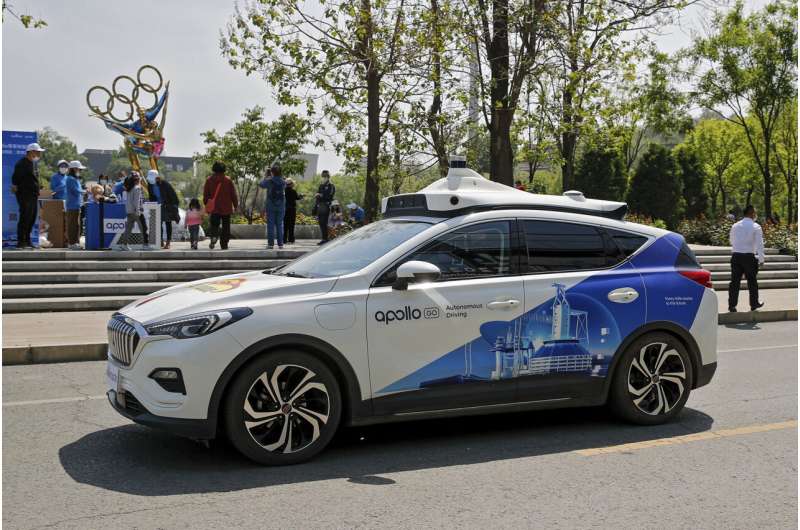China grants first driverless taxi permits to Baidu, Pony.ai
China has granted Chinese internet services company Baidu and a rival autonomous car company, Pony.ai, permits to provide driverless ride-hailing services to the public in Beijing, a significant regulatory step in the country’s pursuit of driverless technology.
The permits given to Baidu and Pony.ai allow them to offer rides without a safety driver behind the wheel to take over in cases of an emergency. The new permits still require a safety supervisor to be seated in the front passenger seat.
Baidu said 10 such autonomous cars began offering rides to passengers within a 60-square-kilometer (23-square-mile) area in suburban Beijing from Thursday.
Baidu already operates an autonomous fleet of taxis in Beijing under its Apollo Go ride-hailing services, but they must have a safety driver behind the wheel.
China has ambitions to lead autonomous driving technology globally but lags the U.S. in introducing such services. Alphabet’s Waymo began offering driverless taxi services in Phoenix, Arizona in 2020.
In 2020, Beijing set a goal for 70% of cars sold in 2030 to have Level 2 and Level 3 self-driving technology. Level 2 is partial driving automation, which means the vehicle can control steering and speed. Level 3 automation means that the car can detect what’s going on around it and drive itself.
Baidu, best known for its search engine and online advertising services, has in recent years invested heavily in autonomous driving and artificial intelligence technology, including automated personal assistants and AI chips.
The company said in a statement that it has accumulated over 27 million kilometers (16 million miles) of road testing over the last nine years with no traffic accidents.
Baidu’s Apollo Go autonomous taxi services operate in nine cities across China, including Shanghai, Shenzhen and Guangzhou.
Baidu rolls out paid driverless taxi service in Beijing
© 2022 The Associated Press. All rights reserved. This material may not be published, broadcast, rewritten or redistributed without permission.
Citation:
China grants first driverless taxi permits to Baidu, Pony.ai (2022, April 28)
retrieved 29 April 2022
from https://techxplore.com/news/2022-04-china-grants-driverless-taxi-baidu.html
This document is subject to copyright. Apart from any fair dealing for the purpose of private study or research, no
part may be reproduced without the written permission. The content is provided for information purposes only.

China has granted Chinese internet services company Baidu and a rival autonomous car company, Pony.ai, permits to provide driverless ride-hailing services to the public in Beijing, a significant regulatory step in the country’s pursuit of driverless technology.
The permits given to Baidu and Pony.ai allow them to offer rides without a safety driver behind the wheel to take over in cases of an emergency. The new permits still require a safety supervisor to be seated in the front passenger seat.
Baidu said 10 such autonomous cars began offering rides to passengers within a 60-square-kilometer (23-square-mile) area in suburban Beijing from Thursday.
Baidu already operates an autonomous fleet of taxis in Beijing under its Apollo Go ride-hailing services, but they must have a safety driver behind the wheel.
China has ambitions to lead autonomous driving technology globally but lags the U.S. in introducing such services. Alphabet’s Waymo began offering driverless taxi services in Phoenix, Arizona in 2020.
In 2020, Beijing set a goal for 70% of cars sold in 2030 to have Level 2 and Level 3 self-driving technology. Level 2 is partial driving automation, which means the vehicle can control steering and speed. Level 3 automation means that the car can detect what’s going on around it and drive itself.
Baidu, best known for its search engine and online advertising services, has in recent years invested heavily in autonomous driving and artificial intelligence technology, including automated personal assistants and AI chips.
The company said in a statement that it has accumulated over 27 million kilometers (16 million miles) of road testing over the last nine years with no traffic accidents.
Baidu’s Apollo Go autonomous taxi services operate in nine cities across China, including Shanghai, Shenzhen and Guangzhou.
Baidu rolls out paid driverless taxi service in Beijing
© 2022 The Associated Press. All rights reserved. This material may not be published, broadcast, rewritten or redistributed without permission.
Citation:
China grants first driverless taxi permits to Baidu, Pony.ai (2022, April 28)
retrieved 29 April 2022
from https://techxplore.com/news/2022-04-china-grants-driverless-taxi-baidu.html
This document is subject to copyright. Apart from any fair dealing for the purpose of private study or research, no
part may be reproduced without the written permission. The content is provided for information purposes only.
